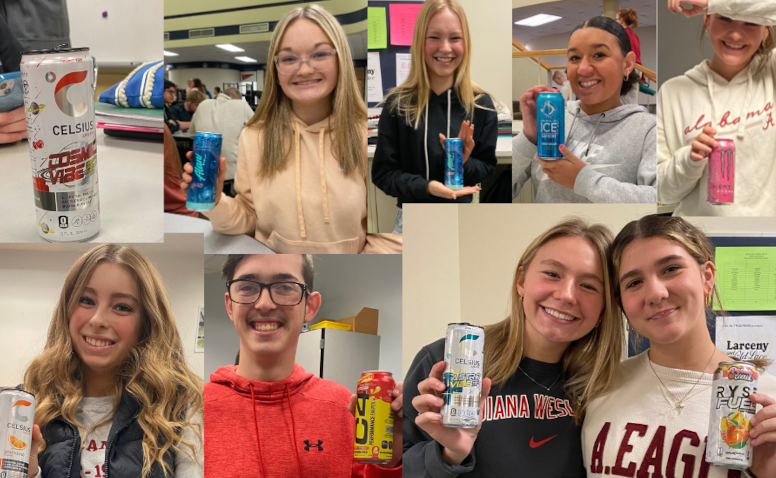By Tru Swoboda
Drugs, alcohol, tobacco, nicotine and the list continues. High school students have been warned persistently of their addictive properties for almost half a century now. Education programs, drug testing, locker checks and specialized health classes have become the norm across America to help control drug abuse in adolescence.
Now, there may be a new addiction taking root, but it doesn’t come in the form of a pill, pen or needle.
In fact, it’s becoming more and more appealing to adolescents than ever before. And it comes in a flashy can that advertises not only the delicious flavors, but a promise to help you take on the day with an immense boost of energy.
Energy drinks are becoming the new craze among high school students. They can be found at most gas stations, grocery stores and vending machines, and now, they even can be purchased in high schools across the country. Here at Delta, the Sparkling Ice brand energy drinks can be purchased in four fruity flavors, containing almost 70 milligrams of caffeine each.
Mrs. Bekah Swanson, the school nurse, says that the increase in energy drink availability to young people is becoming a bigger concern than ever before.
“I don’t think it’s safe for students who regularly drink energy drinks to also purchase them at the snack bar,” Mrs. Swanson said. “It’s just too much caffeine for someone still in the growing process.”
Along with this, Swanson also believes that everybody is different in the way they respond to caffeine.
“I do know some children have been hospitalized after having caffeine because it caused their heart rate to go so high and it was difficult to go back down,” she said.
She doesn’t believe it’s the healthiest option, simply because it’s hard to say how any student could react to high levels of caffeine, especially if they’re trying it for the first time.
This leads to an even bigger point. What is the caffeine recommendation for high school age students?
According to Rebecca M. Beyda, an adolescent medicine specialist at the University of Texas, 100 milligrams is the recommended daily caffeine limit for kids under the age of 17. On the other hand, 400 milligrams is the recommended maximum limit for a healthy adult.
A few students were briefly questioned on their knowledge of this daily limit.
“I’m gonna guess that the recommended daily caffeine limit for someone my age is around 150 to 200 milligrams,” stated sophomore Madison Sanchez.
Sanchez is an avid caffeine consumer and said she drinks two to three energy drinks a week. Her preferred energy drinks are the Alani nutrition energy drinks, containing 200 milligrams of caffeine each.
Another sophomore, Ayden Mitchell, drinks energy drinks regularly as well. When asked the same question, Mitchell answered, “I’m guessing the daily limit for high school students is around 400-500 milligrams a day.”
Ayden prefers to drink C-4 brand energy drinks, containing 200 milligrams of caffeine each. He enjoys the wide variety of flavors and claims they are a great way to start his day at school.
Out of the students who were questioned, only one guessed the accurate caffeine limit for a teenager her age. However, the follow-up to her answer may come as a concerning surprise.

“I’m guessing the recommended limit is around 100 milligrams per day, but if I’m being honest, I have about nine times that amount,” junior Lindsay Lynch said.
Lynch said she drinks around three energy drinks on a daily basis, one every morning and typically one to two more throughout her day. The part that may come as a concern is that her preferred energy drinks, by Bang Energy, contain a whopping 300 milligrams of caffeine per can.
“I’m a really bad morning person, and caffeine just makes me happy,” Lynch says.
But in order to provide a more unbiased representation of how much caffeine students at DHS really are consuming, a survey was taken to show the more in-depth statistics.

From this survey, it was concluded that out of more than 30 respondents, almost 90 percent of students consume at least one energy drink per day, in one form or another.
Along with this, students were also asked which energy drinks they prefer. Based on the data, the three most popular energy drinks among students were Red Bull, Alani Nutrition and Celsius brand energy drinks.
And ironically enough, each of these brand name energy drinks contain at least 200 milligrams of caffeine, which is double the safe amount recommended for adolescents.
Based on this feedback, students may not be aware of the excess caffeine they are consuming on a daily basis. And according to Mrs. Swanson, this lack of recognition is alarming.
Swanson described the heart as any other muscle in the body, and when it is being forced to work, it grows larger and larger. Regular consumption of caffeine forces the heart to work much harder, which explains why some people feel a sudden racing heartbeat after drinking a caffeinated beverage.
“When your heart is constantly racing from the caffeine, it is more prone to tire out, essentially leading to heart failure,” Swanson said.
Along with Swanson, health and physical education teacher Jacob VanPelt also believes that there are some health concerns regarding the increase in energy drink consumption.
“The scary part is when you increasingly consume caffeine, your body will in turn become more tired, making it more reliant on those artificial energy sources,” VanPelt says. “It can become very addictive, especially for teens who are still growing.”
VanPelt expresses that there is nothing necessarily wrong with drinking one energy drink, but it becomes problematic when we routinely consume them daily.
So with the analytical input of Swanson and VanPelt, as well as the data evidence to show the growing popularity of energy drinks among students, there is an undecided verdict.
On one hand, energy drinks are proven to have harmful effects on the overall health of adolescents long term, but on the other hand, there are ways to safely consume them in moderation, without eliminating them completely.
“No, I don’t think that energy drinks are safe by any means, but that won’t prevent students from drinking them,” said Nurse Swanson, ”so consuming them in a moderated manner is a much better choice.”






